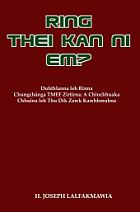Sociologists have informed us that human society is dynamic and subject to change over time. It has been universal truth that no societies remain static or remain unaffected by external forces. In this age of globalization where time and space constricts, every individual, groups or communities are under the influence of external forces. However, in this short essay, I will look into the cultural change among the Mizo by taking colonialism or colonial rule as a framework of analysis.
Culture and change are two different concepts yet are often used together. The Oxford Advanced Learners Dictionary defines culture as ‘the customs, and beliefs, way of life and social organization of a particular country or group’. Another definition of the same line come from a noted anthropologist Edward Taylor who define culture as ‘that complex whole which includes knowledge, belief, art, morals, law, custom, and any other capabilities and habits acquired by man as a member of society’. This definition is one of the most widely accepted and used till today. For Robert Bierstedt culture is ‘the complex whole that consist of the way we think and do and everything we have as members of society’. Yet, so far, there is not a single accepted definition of it[1]. Going by the three definitions above, it can simply be said that culture encompasses a way of life of a group or a community and the values which are there in the human society.
Then what can be cultural change. What comprise of cultural change. Is cultural change the same as social change or are they different? This is a baffling question with no straightforward answer.
Yet, Rao (2001) has made a distinction between the two, social change and cultural change. As he puts ‘all social changes are cultural changes, but all cultural changes need not necessarily be social changes also. Cultural change can be called social changes only when they affect human relations and the social organizations and cause some variation in them’. This distinction is narrow yet significant. In the case of Mizo society, it can be said that there was cultural change which was brought in by the colonial administrators and missionaries in particular from the late 19th Century onwards.
(more…)

 khan, “ Zoram / Hnam hian hnah a la thlak lova, Mizo chi leh kuang vek, unau kan ni a; chuvangin ‘Zo hnahthlak’ tih tawngkam hi i hmang tawh lul lovang u”, a lo ti lawm lawm tawh a. He thu hian belhchian a dawl hle niin a lang.
khan, “ Zoram / Hnam hian hnah a la thlak lova, Mizo chi leh kuang vek, unau kan ni a; chuvangin ‘Zo hnahthlak’ tih tawngkam hi i hmang tawh lul lovang u”, a lo ti lawm lawm tawh a. He thu hian belhchian a dawl hle niin a lang.





 Ka tawn...
Ka tawn...

